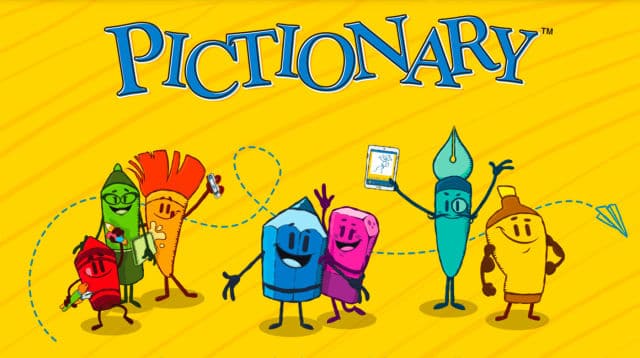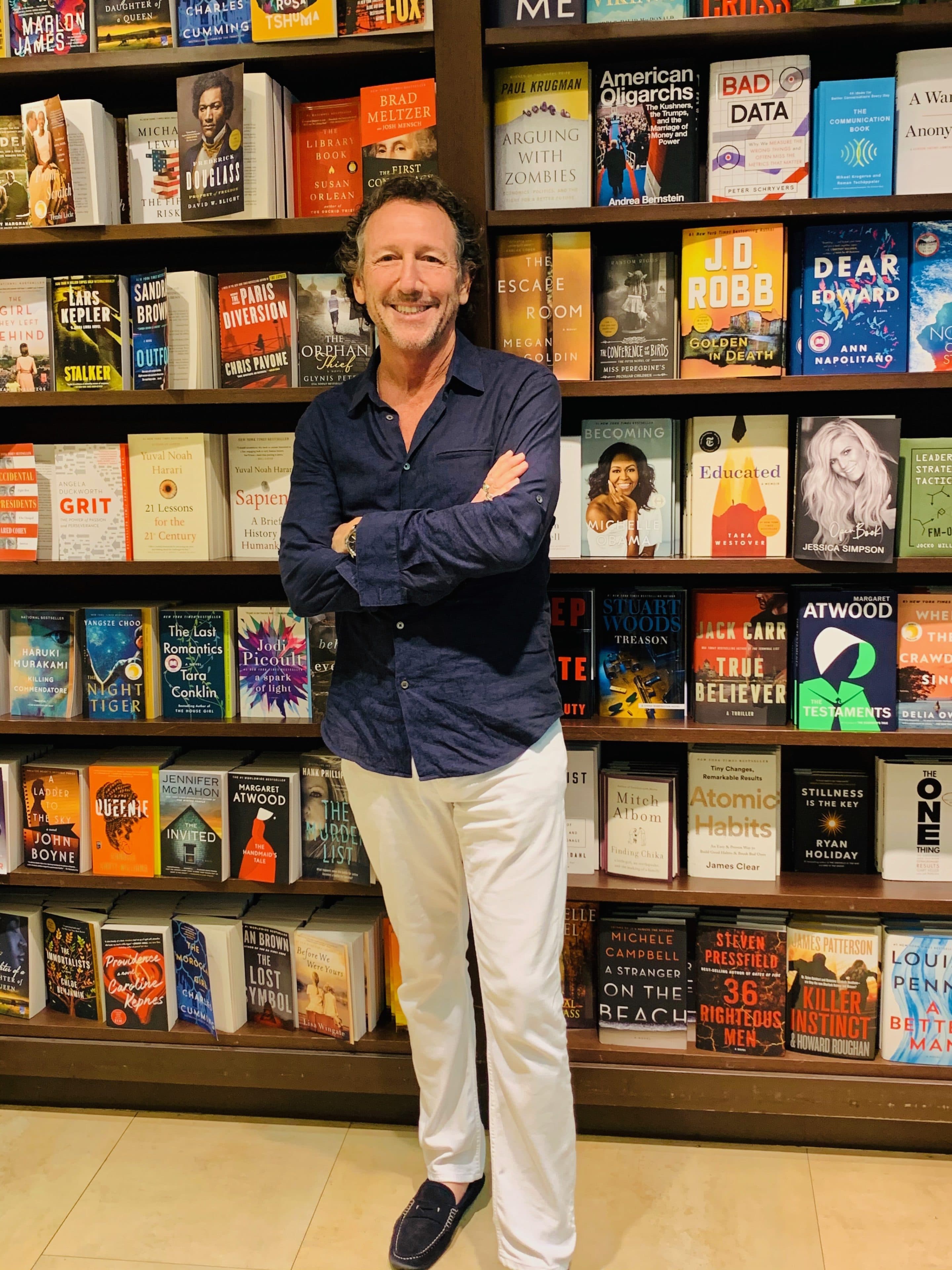Out of all board games, Pictionary is definitely a classic. It would be hard to find a family home that doesn’t stock a copy of the game on a shelf together with other classics such as Risk, Trivial Pursuit and Monopoly. In a time before the prevalence of video games or the internet, Pictionary was the apex of family entertainment, so ingrained in our collective memories that thinking back to a rainy Sunday without the option of resorting to it would seem absurd. But at some point, before the blue rectangular box filled with pencils, paper and cards, Pictionary was just an idea inside a 20-something-year-old’s head. That 20-something-year-old was Robert Angel, the creator of Pictionary.
“I’m open to experiencing new and uncomfortable situations”
Angel, now 61, is a playful and good-natured kind of guy. Some of his regular yearly pastimes include running with bulls in Pamplona, watching horses race at the Kentucky Derby, and attending the notorious Burning Man Festival: “I lead a very varied, entertaining, and interesting existence,” he tells me. One could perhaps expect that the creator of a popular and fun-bringing game would lead a fun life but, as I find out from our conversation, having fun is merely the result of one of Robert’s more defining traits: being open. “It’s all serendipity and randomness. I’m well known for doing crazy things, not because I search out crazy things, it’s because I’m open to experiencing new and uncomfortable situations. Being open has opened many doors,” he says.
“I didn’t have a dream of inventing a world-famous game”
Pictionary’s initial breakthrough didn’t come through analyzing figures and charts or developing business strategies, its success wasn’t predicted or expected by anyone, least of all Angel himself: “I didn’t have a dream of inventing a world-famous game. I just wanted to share with others the fun I had playing this game,” says Angel, who after graduating from college played a rudimentary version of Pictionary with his roommates, randomly drawing words from the dictionary for others to guess. Back in 1985, Angel was working as a waiter in Seattle, and bringing a board game to life wasn’t an ambition of his but rather an experiment he was willing to try out: “I’m just going to create a fun game and see what happens,” he remembers thinking.

Board Game to Book
“Being open” to things has served Angel so well that it has become a life philosophy for him. It’s what has taken him on trips and adventures around the world and it’s what, more recently, compelled him to write Game Changer, his first book about his journey of creating Pictionary and bringing it to market. “This book is a big deal to me. It’s back to being a little uncomfortable. It’s all new territory. I’m stammering just talking about it,” he tells me. But being open, for Angel, is more than just a passive attitude towards life — it also encompasses a great deal of activity. “OPEN” is, in fact, an acronym for Opportunity (“Life is filled with them, not just the Shark Tank moments but opportunities big and small”), Possibility (“Don’t judge the opportunities; let them become possibilities”), Energy (“The a-ha moment when possibility and opportunity collide”), and Now (“Now what? That’s when you take action!”).
“What’s the smallest, easiest first step?”
In Angel’s case, taking action came in the form of an aardvark. Yes, the strange brown mammal with a long nose and tail. That was the first step, or rather, word, into making Pictionary come to life back in 1985. “I had this great concept and the moment I sat down to work on it I panicked. I overthought everything: ‘I can’t do it, I’m just a waiter. I don’t have a plan, I don’t have a dream’,” Angel reminisces. “So I put myself on time out, I stopped thinking about the big picture and all the things that were clouding me. I then thought, ‘What’s the smallest, easiest first step?’ ” Angel would come to the conclusion that the word list was the first thing he should tackle. Coming back from work one day, he grabbed a pad of paper and a pencil and opened the dictionary searching for drawable words for his game. The first word he wrote down was aardvark. “I can’t underscore how big a deal that was. That was my ‘now’ moment. Until I took that first step it wasn’t Pictionary, it was just an idea rattling around in my head,” he says.
Creating a Word List for Pictionary
From “aardvark,” other words followed. There was “barber,” “vegetarian” and “Ronald Reagan.” Then there was the graphic design, playing test rounds with friends and family, scouring the Yellow Pages for printers and box makers, filling boxes by hand, all to produce the first 1000 games in his tiny apartment. The whole of 1985 was devoted to creating and marketing Pictionary. Angel sold everywhere, not just toy stores, from bookstores to department stores to pharmacies and real estate agencies to demonstrating the game in person to sell it to whoever he could. Much like the game itself, Pictionary’s success required imagination rather than knowledge and artistic ambition rather than artistic talent. Above all, it required putting a pencil to paper and starting — the rest would be figured out along the way.
From a Single Step to Selling 38 Million Copies
“We were one task at a time — we still didn’t have a plan at that point — it was just one foot in front of the other. We weren’t thinking we were going to sell a lot of games,” reminisces Angel. It turns out Angel and his partners did sell a lot of games. From 8600 games sold in Seattle back in 1985, they jumped to 350 thousand sales in ‘86, and then to 3 million in ‘87. And in 1988, Angel and his team had sold 11 million copies making Pictionary the biggest-selling game in the world. The numbers kept growing and growing for 17 years. When Robert sold Pictionary to toys-and-games giant Mattel in 2001, 38 million copies of it had been purchased worldwide.
The Hourglass Adds More Pressure to the Game
While Angel’s disposition towards life hasn’t changed much since his 20s — he continues to be open and take opportunities — he does admit that the hourglass always adds more pressure to the game. “At 24, there was zero pressure. If Pictionary didn’t work, no problem. Now, at 61, there is a bit of time pressure,” he explains. “I’m still open, I’m still having a ball, still traveling and meeting new people, but I’m feeling a little pressure to move faster. It’s not debilitating or overriding me; it’s more of a nudge.”
“Just go explore; what you’re looking for will find you”
Feeling that nudge has meant Angel has embarked on a spiritual journey of sorts over the last 5 years, focusing on self-discovery and being of service. He noted that his experience with Pictionary resonates with others, and that the lessons he learned early on were applicable at all stages of life: “If you retired, or you are starting your 2nd or 3rd career or starting a new life, you don’t have to have all the answers, either. People think they should know where they want to go next. Some do, most don’t, so just go explore; what you’re looking for will find you,” he says. Apart from writing a book, Angel has been giving speeches and talks and posting more on social media too, hoping to inspire others in becoming game changers themselves. “It’s all about being open to yourself, to others, and finding your aardvark. Be open to finding your aardvark! You have to, at the very least, take that first small step,” he says.
Instagram: @angelrobb
The ideas expressed here are solely the opinions of the author and are not researched or verified by AGEIST LLC, or anyone associated with AGEIST LLC. This material should not be construed as medical advice or recommendation, it is for informational use only. We encourage all readers to discuss with your qualified practitioners the relevance of the application of any of these ideas to your life. The recommendations contained herein are not intended to diagnose, treat, cure or prevent any disease. You should always consult your physician or other qualified health provider before starting any new treatment or stopping any treatment that has been prescribed for you by your physician or other qualified health provider. Please call your doctor or 911 immediately if you think you may have a medical or psychiatric emergency.
AUTHOR

We will never sell or give your email to others. Get special info on Diet, Exercise, Sleep and Longevity.


